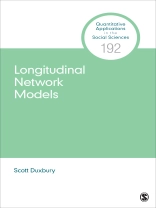Although longitudinal social network data are increasingly collected, there are few guides on how to navigate the range of available tools for longitudinal network analysis. The applied social scientist is left to wonder: Which model is most appropriate for my data? How should I get started with this modeling strategy? And how do I know if my model is any good? This book answers these questions. Author Scott Duxbury assumes that the reader is familiar with network measurement, description, and notation, and is versed in regression analysis, but is likely unfamiliar with statistical network methods. The goal of the book is to guide readers towards choosing, applying, assessing, and interpreting a longitudinal network model, and each chapter is organized with a specific data structure or research question in mind. A companion website includes data and R code to replicate the examples in the book.
Table des matières
Chapter 1. Introduction
Chapter 2: Temporal Exponential Random Graph Models
Chapter 3: Stochastic Actor-oriented Models
Chapter 4: Modeling Relational Event Data
Chapter 5: Network Influence Models
Chapter 6: Conclusion
A propos de l’auteur
Scott Duxbury is an Assistant Professor of Sociology at the University of North Carolina at Chapel Hill. His research examines drug markets, criminal networks, quantitative and computational methods, public opinion, punishment, racism, and the criminal justice system. It has appeared in American Sociological Review, American Journal of Sociology, and Social Forces, among other outlets. Scott′s book, Longitudinal Network Models, provides an introductory text to the suite of statistical models available for longitudinal network data analysis.












